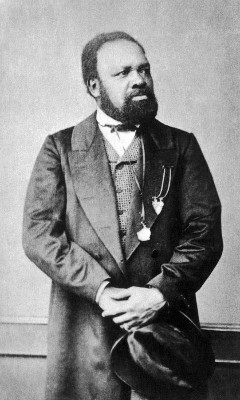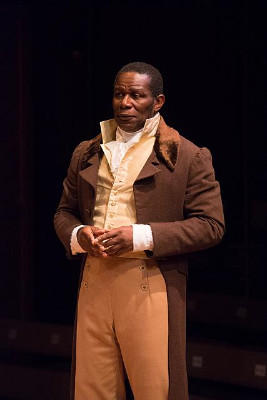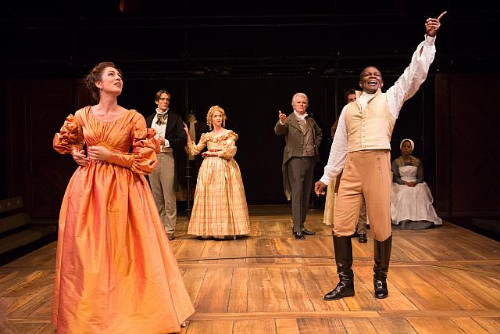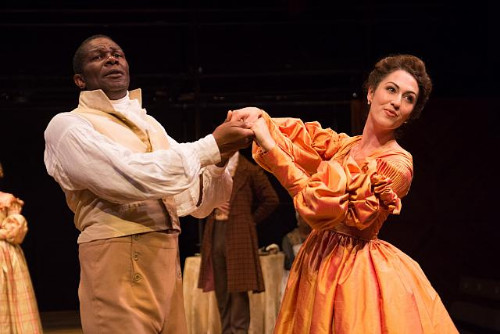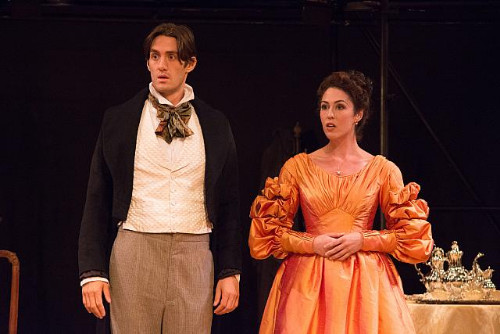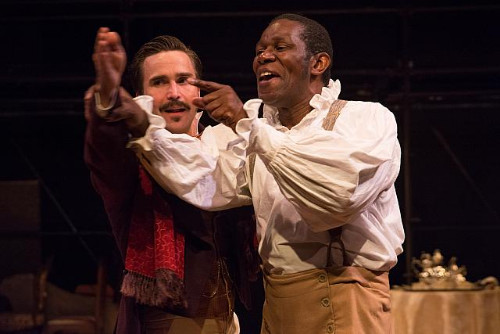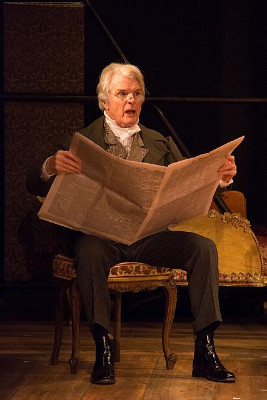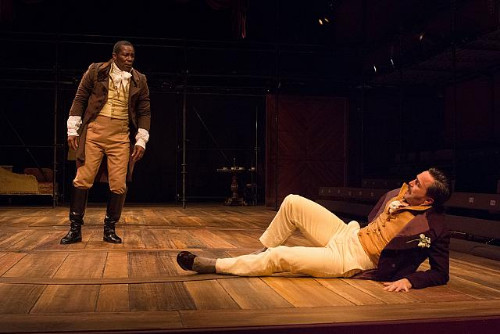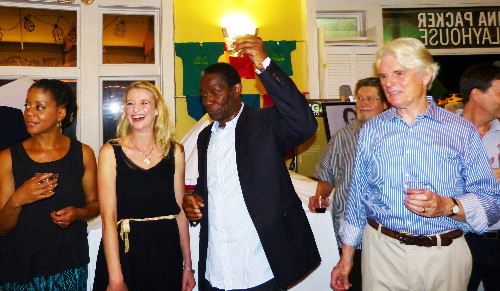John Douglas Thompson in Red Velvet at S&Co;.
Awesome First US Production of Powerful Lolita Chakrabarti Play
By: Charles Giuliano - Aug 15, 2015
Red Velvet
By Lolita Chakrabarti
Directed by Daniela Varon
Set, John McDermott; Costumes, Moira Sine Clinton; Sound, Amt Altaonna; SAlghting, Matthew Miller; Movement consultant, Adrienne Kapstein; Choreographer, Kristin Wold; Fight Choroegrapher, Kevin G. Coleman; Voice Coach, Elizabeth Ingram; Dialect Coach, Susan Cameron; Stage Manager, Diane Healy, German Language Coach, Ute DeFarlo
Cast: Aaron Bartz (Henry Forrester/ Casimir), Ben Chase (Charles Kean), Kelly Curran (Ellen Tree), Malcolm Ingram (Bernard Warde/ Terence), Christianna Nelson (Halina Wozniak/ Betty Lovell/ Margaret Aldridge), Ravin Patterson (Connie), Joe Tapper (Pierre LaPorte), John Douglas Thompson (Ira Aldridge)
Tina Packer Playhouse
Shakespeare & Company
August 6 to September 13, 2015
Yet again John Douglas Thompson triumphs in the most riveting performance of the Berkshire season as the historical, 19th century actor, Ira Aldridge. He was the first actor of color to perform as Othello on the British stage in 1833.
It would be almost a century before that was repeated in London by Paul Robeson in 1930. Some 13 years later, or 110 years after the Aldridge benchmark, Robeson was the first African American actor to play the Moor on Broadway.
In 1999 Thompson played Othello at Trinity Repertory Theatre, then at American Repertory Theatre in 2001, for Shakespeare & Company in 2008 and 2009, followed by off-Broadway at Theatre for a New Audience, in 2009. For the New York production he won OBIE and Lucille Lortel Awards.
Shortly after first seeing Thompson in Othello at S&Co. we initiated a dialogue. I wrote that he was the finest classical theatre actor of his generation. This is now a widely held opinion backed by awards.
Given that he is pursued for theatre, movie and television roles it is notable that he continues to perform at Shakespeare & Company where he serves on the board of trustees.
It was at S&Co., under former artistic director, Tony Simotes, that he developed the one-man-show Satchmo at the Waldorf written by Wall Street Journal drama critic, Terry Teachout, and directed by Gordon Edelstein the artistic director of Long Wharf. For Williamstown Theatre Festival Edelstein has directed Audra McDonald in the currently running Eugene O’Neill play Moon for the Misbegotten.
When not working in New York Thompson continues to tour with Satchmo. He recently performed the role in LA and there will be a San Francisco production in the early fall.
In an increasingly busy career Thompson is being more selective. This coming season he will appear in Ibsen’s The Dolls House. It is scheduled for May 4 to June 12 at New York's Theatre for a New Audience. He will again be directed by Arin Arbus.
Early in his career someone gave him the Errol Hill book "Shakespeare in Sable." In interviews he has referred to the study of African American actors in classical theatre as his Bible. It’s how he first became aware of Ira Aldridge (July 24, 1807 – August 7, 1867).
In 2012 the Lolita Chakrabarti play Red Velvet premiered in London. That British production transferred to St. Ann’s Warehouse in Brooklyn in 2014. When Thompson and director Daniela Varon attended the final performance they immediately initiated negotiations for the first American production at S&Co.
It is a natural fit evoking a powerful performance by Thompson while enhancing the mandate of the company. The evocative play provides perfect synergy between an exposition of theatrical history with period style and the best of contemporary theatre.
“Without Ira Aldridge there would be no opportunity for guys like me” Thompson has said during discussions of the play.
During the standing ovations last night Thompson briefly left the stage. He returned and placed a framed image of a very handsome young Aldrich on an easel. With their backs to the audience he led the actors in a salute to the seminal artist.
There was a champagne reception in the lobby during which the director Varon acknowledged those who worked on the production. At the end of which Thompson spoke about Aldridge, what the actor meant to him personally, and offered a toast in his memory.
This production deeply resonates as a passionate labor of love.
More than history or biography, however, a play has to function as engaging theatre. Thompson said during opening night remarks that it is wonderful when a production can reach beyond entertainment as a vehicle for education. Red Velvet delves into the brutal reality of deeply rooted racism in the arts.
The play somewhat falters, book-ended by opening and closing scenes late in the career of Aldridge who toured for 30 years. He abandoned Great Britain after the disaster of just two nights of performing Othello at Theater Royal Covent Garden. The American born actor had worked in obscurity for ten years before replacing the renowned Edmund Keen who took ill and soon died.
He was a teenager when he left America with no prospect of a career in theatre.
In his dressing room in Lodz, Poland 22-year-old reporter, Halina Wozniak (Christiana Nelson), has forced her way in for an interview. The actor, then in poor health and almost 60, was preparing for a performance as King Lear. Nelson's faltering attempt at a German accent makes the scene little more than a distraction. Her return at the end of the play, after a galvanic, ferocious confrontation between Aldridge and Pierre LaPorte (Joe Tapper) the manager of the theatre, is an anti climax.
In other scenes Nelson is fine as Margaret the wife of Aldridge and Betty Lovell but the play would benefit by deleting or recasting those scenes.
The heart of the play involves a confrontation with the company when Aldridge is introduced by Pierre as an emergency replacement for Kean. Aldridge will perform that very night. There is a good house based on the appearance of Kean and Aldridge is described as promising at the box office. Management hopes to avoid going dark and losing money.
The greatest resistance and scornful resentment comes from Charles (Ben Chase) the son of Edmund Kean. He has been playing Iago and insists on stepping up to play Othello. It is soon revealed that he is a hack destined to spend a career in minor and supporting roles. It may be argued, however, that in the canon Iago is one of the greatest roles.
It was actually Thompson’s S&Co. performance that redefined Othello as a love story and affirmed the theatrical primacy of Othello over Iago.
Not only was it unprecedented that Aldridge was the first black man to play the Moor but as we learned he also had a progressive approach to performing.
The finely tuned and insightful direction of Varon has evoked all of the complex nuances of the stultified, exaggerated, mimed manner of archly performing the Bard. In the cavernous, dimly lit theaters of the day the actors over played their roles in order to reach the audience seated in the upper balconies.
In this S&Co production a thrust stage is close and intimate. It is absurdly comic when we see the actors recreate the antiquated period style. In this approach nobody is more laughable that Charles Kean who is perfectly if absurdly performed by the superb Chase.
Asserting his renowned lineage Charles argued for taking over the leading role. Aldridge delivers a zinger “Don’t you know that lightning never strikes twice in the same place.”
Enforcing her approach to recreating the classical style Varon has the actors and stage hands choreographed (by Kristin Wold) as they move the furniture and props between scenes. There is also the effective use of lighting by Matthew Miller to isolate action and punctuate transitions between scenes.
There were appropriate period costumes particularly the exquisite gowns. In the designs by Moria Cline Clinton, however, we wonder why the pants of Aldrich were fastened with buttons but with zippers for the other male costumes. The difference called attention to the error.
Working with Ellen Tree (Kelley Curran) who will play Desdemona she appears to be open to his suggestions for more emotion and naturalism in their scenes. She is engaged to Charles. In reality they married after ten years and toured together.
There was outrage in response to the naturalism of Aldridge which is presented as a precursor of method acting. There is a discussion of the various techniques of the period which is lost on all but those versed in theatre history. That reflects a script rich in information all of which may not be absorbed by the audience.
The actors discussing the intended changes vary in their responses from the rage of Charles to the compliance of Ellen. Terence, the always outstanding S&Co. regular (Malcolm Ingram) and Henry (Aaron Bartz) who is equally fine, are willing to play along.
A foil and silent witness to the charged racism in the room is represented by the Jamaican servant Connie (Ravin Patterson). Mostly she keeps her feeling to herself while serving tea. She is a surrogate for people of color as eye witnesses to oppression. She was a compelling reminder of how the issues and feelings of black people remain largely invisible. Sadly, it was as true then as it is today that we have to be reminded that "black lives matter."
After the first night of performing Othello the actor is with his wife Margaret. He is disturbed that she did not get a proper seat. Ira wants to know what she thought of the performance. They are interrupted by Ellen who has ideas of how they might improve their interaction. Margaret departs for a party leaving them alone.
They rehearse more realism into the escalating jealousy that results in the murder of Desdemona. The acting gets rough. While more compelling for the audience it left Ellen with bruises. The infuriated Charles insists on taking her to a hospital. This evidence of abuse leads to ousting Aldridge.
When Thompson sinks his teeth into scenes his performance is astonishing. We are always intrigued by his deeply rooted discipline, impeccable training, perfect and measured enunciation, and ability to ratchet up to scorching passion.
The audience clung to the passages when he performed excerpts from Othello. The play comes to an emotional climax in a confrontation with Pierre who is forced by his board to dismiss the actor. He had pleaded with Aldridge to go easy and play it down. He advised letting the audience ease into and get used to seeing a black man on stage.
The pacing of this scene is stunning and masterful. It is established that they are friends with a history of mutual respect. Pierre articulates that it was he alone who gave Aldridge that great opportunity. The tension builds as Aldridge explores other ways of dealing with the crisis. Rebuffed at every move with the response that “You just don’t listen” Ira culminates in a violent outburst.
In a fight scene choreographed by Kevin G. Coleman the audience gasps as the two men go sprawling across the stage. There is a withering response by Pierre that Ira has finally revealed his true self. Wow.
The reading of devastating, racist reviews sends a chill through the audience. They are read with relish and hate by Charles. When the actors depart in haste Ira is alone with Connie. While she is dutifully returning the newspapers to the office of Pierre he forces her to give them to him.
What we heard were the actual vicious, demeaning, racist reviews. They demolished any hope of a career in London.
While never again performing in England we learn that Aldridge toured for 30 years on the Continent and was widely celebrated. There was a plan to perform in America but he died just before that was to happened.
Red Velvet is destined to be widely produced by regional theatres. When not otherwise engaged it is possible that Thompson will be enticed into playing in Satchmo and Red Velvet in major cities.
Once again last night, here in the Berkshires, John Douglas Thompson notched another benchmark for American theatre history.


